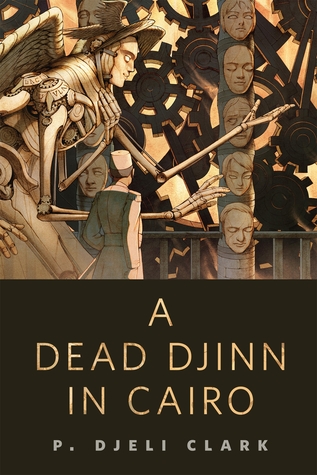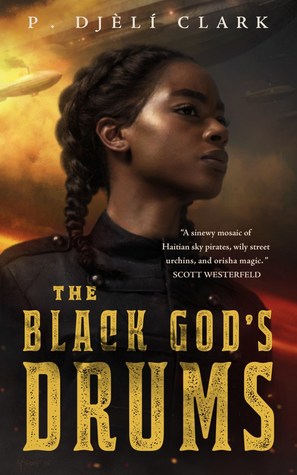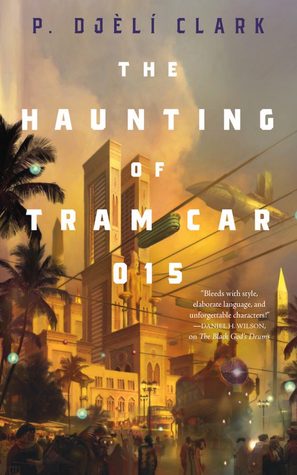Interview with P. Djèlí Clark (THE HAUNTING OF TRAM CAR 015)
Today we are delighted to welcome accomplished short-story and novella author P. Djèlí Clark to the Fantasy Hive, coinciding with the release of his latest novella from Tor.com, The Haunting of Tram Car 015, our review of which can be found here.
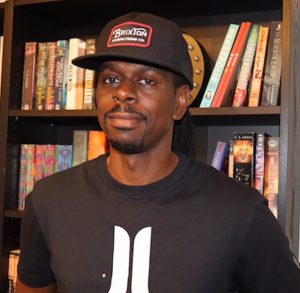 Phenderson Djéli Clark is the author of the novellas The Black God’s Drums (August 2018), winner of a 2019 Alex Award from the American Library Association, and The Haunting of Tram Car 015 (February 2019). His short stories have twice made the Locus Recommended Reading List and have appeared in online venues such as Fireside Fiction, Beneath Ceaseless Skies, Heroic Fantasy Quarterly, and in print anthologies including Griots, Hidden Youth, and Clockwork Cairo. He is loosely associated with the quarterly FIYAH: A Magazine of Black Speculative Fiction and an infrequent reviewer at Strange Horizons.
Phenderson Djéli Clark is the author of the novellas The Black God’s Drums (August 2018), winner of a 2019 Alex Award from the American Library Association, and The Haunting of Tram Car 015 (February 2019). His short stories have twice made the Locus Recommended Reading List and have appeared in online venues such as Fireside Fiction, Beneath Ceaseless Skies, Heroic Fantasy Quarterly, and in print anthologies including Griots, Hidden Youth, and Clockwork Cairo. He is loosely associated with the quarterly FIYAH: A Magazine of Black Speculative Fiction and an infrequent reviewer at Strange Horizons.
The author resides in a small Edwardian castle in New England with his wife, twin infant daughters, and pet dragon, where he writes speculative fiction when he is not playing the part of a mild-mannered academic historian. He rambles on issues of speculative fiction, politics, and diversity at his blog The Disgruntled Haradrim.
We’re here to celebrate books, so let’s open with a great book you’ve read recently:
Since we’re talking genre, I’ll stay there and go with Naomi Novik’s Spinning Silver. I’ve been a huge fan of the Temeraire series (talking dragons in the Napoleonic wars!), but really enjoy Novik’s more dark takes on fairy tales, like Uprooted. Her latest novel Spinning Silver didn’t disappoint. Beautifully woven, with complex characters, both human and otherworldly, and told from different perspectives. Gorgeous stuff.
One thing that stands out about your work is the fantastic worldbuilding. I hate to ask “where do you get your ideas?” but I’d love to hear how you go about building your worlds. For example, does your research inspire the story, or vice versa? How does your academic work inform your SFF writing?
I’d like to say there’s some method to the madness. The reality is I’m a serial day dreamer. My inner Walter Mitty just keeps my head at times in the clouds. So I’ll tend to dream up characters and start building the worlds around them—or vice versa. I’m sure I’m impacted at times by my academic work—as in The Black God’s Drums or The Secret Lives of the Nine Negro Teeth of George Washington. Other times, it’s just me letting my imagination wander. All of it takes research. I may have an idea drawn from some bit of random folklore I once read, and I can go tumbling down the rabbit hole trying to learn as much about it as possible. So, to me anyway, it’s an organic process.
Isn’t all that worldbuilding a lot of work for just a short story (or even a novella)? What attracts you to the shorter formats, and are you working on anything longer form?
You know, I never look at it that way. I always want whatever story I write to just feel fully formed—no matter the length. Sure, if it’s a really short story, I can’t go in depth. You’re not getting whole Elven languages. Sorry. But there are ways to leave little tantalizing bits here and there, to spur readers to imagine that behind those scant descriptions there’s this fully formed world waiting to be explored. 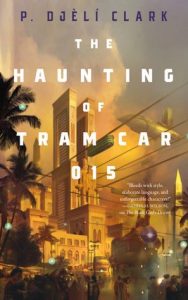
I always laugh when I get asked about if I’m working on anything longer. When I first started writing, it was full novels—I’m talking massive, multi-tomed, epic fantasy door-stoppers. My earliest attempts at short stories would end somewhere around 30,000 words. It was embarrassing. I had to sit down and train myself to write actual short stories—as it was the only way to get published in most SFF markets. It’s still not an easy thing. If I’m doing fantasy, it’s nearly impossible for me to stay under 10,000 words. I end up having to do LOTS of cutting to get them down to something less obscene. So when you read a novella of mine, remember, it probably started as a short story! As for novel length works—be careful what you wish for!
That said, how great is it that Tor.com are making such a success of the novella form?
It’s the most amazing thing ever, especially for wordy writers like myself. Before now, lots of things I wrote just languished in the purgatory of my flash drive or Dropbox. There were just no markets for them. So Tor.com Publishing taking a chance that the novella form would be successful literally helped save my writing life.
I ended up writing for them after my novelette A Dead Djinn in Cairo was published on Tor.com in 2016. Diana Pho, an editor at Tor.com, took a chance on the story. And to my surprise and delight, it was very well received. Afterwards I pitched The Black God’s Drums, which she also liked and took a chance on. So I kind of lucked out in finding an editor willing to work with my writing. Really grateful.
In your upcoming novella, The Haunting of Tram Car 015, you revisit the world of your excellent short story A Dead Djinn in Cairo, albeit with different main characters. Was this just how the story came about, or was it a conscious decision to make each stand alone?
When I published A Dead Djinn in Cairo in 2016 I wasn’t certain what else I was going to do in that world—if anything. The reception to the story, however, convinced me I needed to do more. Praise: it’s the secret for getting more out of a writer. So sometime in the summer of 2017, literally over a weekend, I sat down and really fleshed out the entire world with a detailed timeline. Once that was done, I was ready to write. I decided to go with different main characters, to help me explore the expanded setting I’d created. Though (hint hint) the characters from Dead Djinn aren’t exactly gone. But I’ve said too much!
(Speaking of A Dead Djinn in Cairo, if you want a taste of what’s to come in Haunting, you can go have a read right now!)
Yes! Please do!
I know you’ve also published critical non-fiction about the SFF genre. Does that put any pressure on your fiction in terms of living up to your principles?
Can’t be hypocrites can we! But seriously, I hope my critical blog posts and essays on SFF aren’t taken as a means to limit what writers can do within genre. If anything, I want us to expand our horizons. In those posts I’m often thinking publicly about my own writing—possible shortcomings, places of self-critique, grappling with to approach thorny issues. Getting it right is sometimes hard. As I always say, you might try and still fail. In epic fashion. But I’m hoping I’m always aware of what I write, that I’m always thinking about the impact of how I construct my characters, and stories. I think that’s the least we can do as creators. Some people say, “oh that’s too much, I just want to write.” I say, if you truly value what you create, you’ll put as much thought into it as possible.
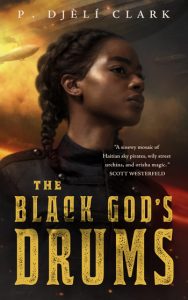
With respect to this criticism from yourself and others (i.e. regarding racism, sexism, and other prejudices and inequalities in SFF), how do you rate the state of the genre right now? Do you think we’re getting to a better place? What work is still to be done?
Hmm. I guess the state of genre is only as good as the writers, publishers, editors, creators, etc. within it. I do think we’re getting to a better place—but only because you now have a broader diversity of writers that editors and publishers are willing to take a risk on. Mind you, we’ve always been here! Black writers, women writers, queer writers, Black women queer writers—have always been here. Just not enough of us have been able to tell our stories on such large platforms. So better, but with lots of work still to do. When you look at the numbers of Black writers being published in pro-markets, the stats are still pretty dismal. Same for writers of colour of YA. It gets worse when we go behind the scenes to look for diversity in publishing. And I haven’t even started on the backlash—from the Puppies with the Sads to the vitriol that goes on in fan spaces. So nobody should start breaking out the champagne any time soon. Don’t even go shopping for champagne. Keep champagne off your grocery list. Instead, get to work to make that “better place” we’re all claiming we want. If we really want it.
To my shame, I don’t actually follow that many other short fiction writers or publications. Can you recommend a few to me (and our readers)?
Let’s see. One of my favorite publications is FIYAH: Magazine of Black Speculative Fiction. Lots of really great writers there, both established and up and coming. Some of my favorite shorter fiction writers right now: Cassandra Khaw & Tade Thompson come immediately to mind as people I read and am just blown away by both the writing and the imagination in their stories.
Finally, a Fantasy Hive staple is what we like to call a ‘shark elevator pitch’. (It’s exactly the same as an elevator pitch, but with sharks.) (Well, one shark. Which, by the way, is currently picking between its rows of teeth to try and dislodge the remains of the last author who stepped onto its elevator.)
Sounds groovy.
So: why should readers check out your work? A shark elevator pitch of your own stories in no more than three sentences – go!
I write stuff steeped in the fantastic. With diverse heroines and heroes. Set within dazzling worlds.
Before we go, where can we find your writing?
My upcoming novella The Haunting of Tram Car 015 is due out from Tor.com Publishing today! They also published my previous novella from 2018, The Black God’s Drums. I’ve been published in online venues such as Beneath Ceaseless Skies, Lightspeed, Heroic Fantasy Quarterly, and Daily Science Fiction to name a few.
That’s it, and thanks so much for answering our questions!
Thanks for this great interview!
P. Djèlí Clark is the author of speculative short stories and novellas, including A Dead Djinn in Cairo and The Black God’s Drums. His latest novella, The Haunting of Tram Car 015, is out from Tor.com publishing TODAY!

